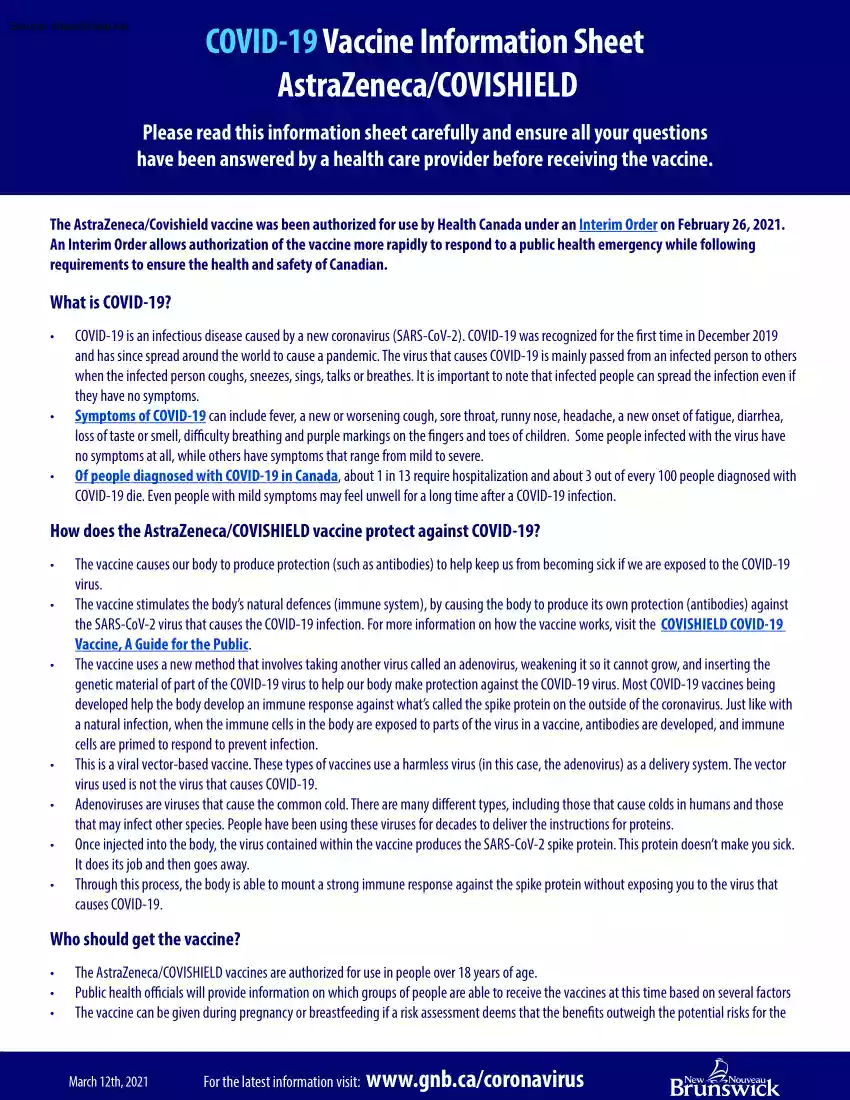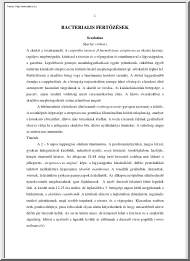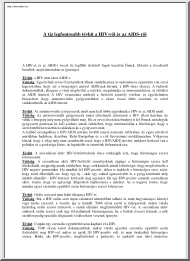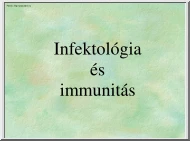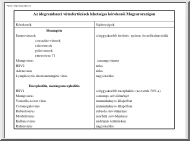Datasheet
Year, pagecount:2021, 3 page(s)
Language:English
Downloads:3
Uploaded:May 27, 2021
Size:618 KB
Institution:
-
Comments:
Attachment:-
Download in PDF:Please log in!
Comments
No comments yet. You can be the first!Most popular documents in this category
Content extract
COVID-19 Vaccine Information Sheet AstraZeneca/COVISHIELD Please read this information sheet carefully and ensure all your questions have been answered by a health care provider before receiving the vaccine. The AstraZeneca/Covishield vaccine was been authorized for use by Health Canada under an Interim Order on February 26, 2021. An Interim Order allows authorization of the vaccine more rapidly to respond to a public health emergency while following requirements to ensure the health and safety of Canadian. What is COVID-19? • • • COVID-19 is an infectious disease caused by a new coronavirus (SARS-CoV-2). COVID-19 was recognized for the first time in December 2019 and has since spread around the world to cause a pandemic. The virus that causes COVID-19 is mainly passed from an infected person to others when the infected person coughs, sneezes, sings, talks or breathes. It is important to note that infected people can spread the infection even if they have no symptoms.
Symptoms of COVID-19 can include fever, a new or worsening cough, sore throat, runny nose, headache, a new onset of fatigue, diarrhea, loss of taste or smell, difficulty breathing and purple markings on the fingers and toes of children. Some people infected with the virus have no symptoms at all, while others have symptoms that range from mild to severe. Of people diagnosed with COVID-19 in Canada, about 1 in 13 require hospitalization and about 3 out of every 100 people diagnosed with COVID-19 die. Even people with mild symptoms may feel unwell for a long time after a COVID-19 infection How does the AstraZeneca/COVISHIELD vaccine protect against COVID-19? • • • • • • • The vaccine causes our body to produce protection (such as antibodies) to help keep us from becoming sick if we are exposed to the COVID-19 virus. The vaccine stimulates the body’s natural defences (immune system), by causing the body to produce its own protection (antibodies) against the SARS-CoV-2
virus that causes the COVID-19 infection. For more information on how the vaccine works, visit the COVISHIELD COVID-19 Vaccine, A Guide for the Public. The vaccine uses a new method that involves taking another virus called an adenovirus, weakening it so it cannot grow, and inserting the genetic material of part of the COVID-19 virus to help our body make protection against the COVID-19 virus. Most COVID-19 vaccines being developed help the body develop an immune response against what’s called the spike protein on the outside of the coronavirus. Just like with a natural infection, when the immune cells in the body are exposed to parts of the virus in a vaccine, antibodies are developed, and immune cells are primed to respond to prevent infection. This is a viral vector-based vaccine. These types of vaccines use a harmless virus (in this case, the adenovirus) as a delivery system The vector virus used is not the virus that causes COVID-19. Adenoviruses are viruses that cause the
common cold. There are many different types, including those that cause colds in humans and those that may infect other species. People have been using these viruses for decades to deliver the instructions for proteins Once injected into the body, the virus contained within the vaccine produces the SARS-CoV-2 spike protein. This protein doesn’t make you sick It does its job and then goes away. Through this process, the body is able to mount a strong immune response against the spike protein without exposing you to the virus that causes COVID-19. Who should get the vaccine? • • • The AstraZeneca/COVISHIELD vaccines are authorized for use in people over 18 years of age. Public health officials will provide information on which groups of people are able to receive the vaccines at this time based on several factors The vaccine can be given during pregnancy or breastfeeding if a risk assessment deems that the benefits outweigh the potential risks for the March 12th, 2021 For the
latest information visit: www.gnbca/coronavirus • individual and the fetus; and, if informed consent includes discussion about the absence of evidence on the use of COVID-19 vaccine in this population. For more information, please refer to the Patient Information Sheet for Pregnancy and Breastfeeding Women on the GNB COVID Vaccine website. For any related concerns, please talk to your Healthcare Provider Individuals with auto-immune diseases or who take auto-immune medications can be given the vaccine if a risk assessment deems that the benefits outweigh the potential risks for the individual and if informed consent includes discussion about the absence of evidence on the use of COVID-19 vaccine in this population. For more information, please refer to the Guidance for Patients or Persons with Autoimmune conditions and/or Immunosuppression. For any related concerns, please talk to your Healthcare Provider You should not receive the vaccine if you: • • Had a severe
reaction to a previous dose of COVID-19 vaccine, including an allergic reaction. Have any symptoms that could be due to COVID-19. Talk to your healthcare provider about symptoms and getting a COVID-19 test Your healthcare provider will advise you when you are able to receive the vaccine. In addition to the information above, tell the healthcare provider if: • You have fainted or felt faint after receiving past vaccines or medical procedures. Your healthcare provider may recommend that you receive the vaccine lying down to prevent fainting. Can I choose which vaccine I want to receive? While there are many different brands of COVID-19 vaccines, experts are encouraging people to take the vaccine they are offered. All vaccines protect against severe illness from COVID-19. The type of vaccine you are offered is based on a variety of factors For more information, see the GNB public vaccine section. How is the vaccine administered? The vaccine is given as a needle in the upper arm and
will require two doses. What are the risks of the vaccine? • • Side effects can develop in the few days after receiving the vaccines. Although these side effects are not serious to your health, they may make you feel unwell for a few days; they will go away on their own. These types of side effects are expected and can indicate the vaccine is working to produce protection. In the study of the AstraZeneca vaccine, side effects included one or more of the following: » » » » » » » » • pain, redness or swelling where the needle was given tiredness headache muscle pain joint pain chills fever nausea Rarely allergic reactions can occur after receiving a vaccine. Symptoms of an allergic reaction include: » hives (bumps on the skin that are often very itchy), » swelling of your face, tongue or throat, or » difficulty breathing such as cough or wheeze. The clinic staff are prepared to manage an allergic reaction should it occur. Seek immediate medical care if you develop
any of these symptoms • It is important to note that you cannot get COVID-19 infection from the vaccine. What measures have been put in place to safely provide immunizations during COVID-19? Health care providers are being very careful to prevent the spread of COVID-19 when offering immunizations. Examples of extra safety measures include the following: March 12th, 2021 For the latest information visit: www.gnbca/coronavirus • • • • You will be asked about any COVID-19 symptoms when you arrive at the clinic. People with symptoms of COVID-19 should not attend the clinic. You will be asked to wear a mask while at the clinic, as well as to clean your hands, and to stay at least 2 metres (6 feet) from others (except those you live with). The staff will also be wearing personal protective equipment and will be cleaning their hands before and after each client. Other measures may also be put in place in clinics. Be sure to read and follow any signs or instructions provided
What should you do before coming to the clinic? • • • • • Wear a short-sleeve shirt or top with sleeves that are easy to roll up. To prevent feeling faint while being vaccinated, have something to eat before coming to the clinic. Bring your mask. Bring any identification required by the clinic, such as your health card. Bring your immunization record with you and/or download the CANImmunize app to keep track of this and other vaccines. What should you do after receiving the vaccine? • • • • • • • • You will be asked to wait at least 15 minutes after receiving the vaccine to be sure you are feeling well. Longer waiting times of 30 minutes may be recommended if there is concern about a possible vaccine allergy. You may be asked by the health care provider to wait in the clinic, or if an adult is with you and you have a warm, dry place to wait (such as in your vehicle), you may be asked to wait outside of the clinic. Inform a health care provider right away if
you feel unwell while waiting. You should not leave the clinic (or clinic parking lot) for at least 15 to 30 minutes after receiving your vaccine, based on the recommendation of the health care provider, and should not leave if you are feeling unwell. Once you leave the clinic, call 9-1-1 right away if you develop any serious symptoms or symptoms of an allergic reaction such as hives (bumps on the skin that are often very itchy), swelling of your face, tongue or throat, or difficulty breathing. Inform your health care provider of any concerning side effects after receiving the vaccine. If your side effects mimic COVID-19 symptoms, stay home until you feel better and get tested if your symptoms last longer than two days. It is possible to contract the virus prior to your vaccination and not know it. Continue to follow the recommendations of local public health officials to prevent spread of COVID-19, which may include wearing a mask, staying at least 2 metres from others and limiting /
avoiding contact with others outside your household. Do not receive any other vaccines (except for your second COVID-19 vaccine) until at least 28 days after a COVID-19 vaccine (unless recommended by your health care provider). If you are planning to become pregnant, you may want to delay this until 28 days or more have passed after completing the COVID-19 vaccinations. Keep your immunization record with information about the COVID-19 vaccine in a safe place. When should I return for my second dose? If this is your first dose of the COVID-19 vaccine, be sure to return for your second dose as advised by your health care provider. This is very important to ensure the vaccine provides long-term protection. You should receive the same COVID-19 vaccine for your first and second dose Bring your immunization record with you when you come for your next dose. If you have any questions, please speak with the person providing the vaccine or contact: Zone 1 - Moncton Zone 2 - Saint John Zone 3
- Fredericton Zone 4 - Edmundston Zone 5 - Campbellton Zone 6 - Bathurst Zone 7 - Miramichi March 12th, 2021 506-856-2401 506-658-2454 506-453-5200 506-735-2065 506-789-2266 506-547-2062 506-778-6102 For the latest information visit: www.gnbca/coronavirus
Symptoms of COVID-19 can include fever, a new or worsening cough, sore throat, runny nose, headache, a new onset of fatigue, diarrhea, loss of taste or smell, difficulty breathing and purple markings on the fingers and toes of children. Some people infected with the virus have no symptoms at all, while others have symptoms that range from mild to severe. Of people diagnosed with COVID-19 in Canada, about 1 in 13 require hospitalization and about 3 out of every 100 people diagnosed with COVID-19 die. Even people with mild symptoms may feel unwell for a long time after a COVID-19 infection How does the AstraZeneca/COVISHIELD vaccine protect against COVID-19? • • • • • • • The vaccine causes our body to produce protection (such as antibodies) to help keep us from becoming sick if we are exposed to the COVID-19 virus. The vaccine stimulates the body’s natural defences (immune system), by causing the body to produce its own protection (antibodies) against the SARS-CoV-2
virus that causes the COVID-19 infection. For more information on how the vaccine works, visit the COVISHIELD COVID-19 Vaccine, A Guide for the Public. The vaccine uses a new method that involves taking another virus called an adenovirus, weakening it so it cannot grow, and inserting the genetic material of part of the COVID-19 virus to help our body make protection against the COVID-19 virus. Most COVID-19 vaccines being developed help the body develop an immune response against what’s called the spike protein on the outside of the coronavirus. Just like with a natural infection, when the immune cells in the body are exposed to parts of the virus in a vaccine, antibodies are developed, and immune cells are primed to respond to prevent infection. This is a viral vector-based vaccine. These types of vaccines use a harmless virus (in this case, the adenovirus) as a delivery system The vector virus used is not the virus that causes COVID-19. Adenoviruses are viruses that cause the
common cold. There are many different types, including those that cause colds in humans and those that may infect other species. People have been using these viruses for decades to deliver the instructions for proteins Once injected into the body, the virus contained within the vaccine produces the SARS-CoV-2 spike protein. This protein doesn’t make you sick It does its job and then goes away. Through this process, the body is able to mount a strong immune response against the spike protein without exposing you to the virus that causes COVID-19. Who should get the vaccine? • • • The AstraZeneca/COVISHIELD vaccines are authorized for use in people over 18 years of age. Public health officials will provide information on which groups of people are able to receive the vaccines at this time based on several factors The vaccine can be given during pregnancy or breastfeeding if a risk assessment deems that the benefits outweigh the potential risks for the March 12th, 2021 For the
latest information visit: www.gnbca/coronavirus • individual and the fetus; and, if informed consent includes discussion about the absence of evidence on the use of COVID-19 vaccine in this population. For more information, please refer to the Patient Information Sheet for Pregnancy and Breastfeeding Women on the GNB COVID Vaccine website. For any related concerns, please talk to your Healthcare Provider Individuals with auto-immune diseases or who take auto-immune medications can be given the vaccine if a risk assessment deems that the benefits outweigh the potential risks for the individual and if informed consent includes discussion about the absence of evidence on the use of COVID-19 vaccine in this population. For more information, please refer to the Guidance for Patients or Persons with Autoimmune conditions and/or Immunosuppression. For any related concerns, please talk to your Healthcare Provider You should not receive the vaccine if you: • • Had a severe
reaction to a previous dose of COVID-19 vaccine, including an allergic reaction. Have any symptoms that could be due to COVID-19. Talk to your healthcare provider about symptoms and getting a COVID-19 test Your healthcare provider will advise you when you are able to receive the vaccine. In addition to the information above, tell the healthcare provider if: • You have fainted or felt faint after receiving past vaccines or medical procedures. Your healthcare provider may recommend that you receive the vaccine lying down to prevent fainting. Can I choose which vaccine I want to receive? While there are many different brands of COVID-19 vaccines, experts are encouraging people to take the vaccine they are offered. All vaccines protect against severe illness from COVID-19. The type of vaccine you are offered is based on a variety of factors For more information, see the GNB public vaccine section. How is the vaccine administered? The vaccine is given as a needle in the upper arm and
will require two doses. What are the risks of the vaccine? • • Side effects can develop in the few days after receiving the vaccines. Although these side effects are not serious to your health, they may make you feel unwell for a few days; they will go away on their own. These types of side effects are expected and can indicate the vaccine is working to produce protection. In the study of the AstraZeneca vaccine, side effects included one or more of the following: » » » » » » » » • pain, redness or swelling where the needle was given tiredness headache muscle pain joint pain chills fever nausea Rarely allergic reactions can occur after receiving a vaccine. Symptoms of an allergic reaction include: » hives (bumps on the skin that are often very itchy), » swelling of your face, tongue or throat, or » difficulty breathing such as cough or wheeze. The clinic staff are prepared to manage an allergic reaction should it occur. Seek immediate medical care if you develop
any of these symptoms • It is important to note that you cannot get COVID-19 infection from the vaccine. What measures have been put in place to safely provide immunizations during COVID-19? Health care providers are being very careful to prevent the spread of COVID-19 when offering immunizations. Examples of extra safety measures include the following: March 12th, 2021 For the latest information visit: www.gnbca/coronavirus • • • • You will be asked about any COVID-19 symptoms when you arrive at the clinic. People with symptoms of COVID-19 should not attend the clinic. You will be asked to wear a mask while at the clinic, as well as to clean your hands, and to stay at least 2 metres (6 feet) from others (except those you live with). The staff will also be wearing personal protective equipment and will be cleaning their hands before and after each client. Other measures may also be put in place in clinics. Be sure to read and follow any signs or instructions provided
What should you do before coming to the clinic? • • • • • Wear a short-sleeve shirt or top with sleeves that are easy to roll up. To prevent feeling faint while being vaccinated, have something to eat before coming to the clinic. Bring your mask. Bring any identification required by the clinic, such as your health card. Bring your immunization record with you and/or download the CANImmunize app to keep track of this and other vaccines. What should you do after receiving the vaccine? • • • • • • • • You will be asked to wait at least 15 minutes after receiving the vaccine to be sure you are feeling well. Longer waiting times of 30 minutes may be recommended if there is concern about a possible vaccine allergy. You may be asked by the health care provider to wait in the clinic, or if an adult is with you and you have a warm, dry place to wait (such as in your vehicle), you may be asked to wait outside of the clinic. Inform a health care provider right away if
you feel unwell while waiting. You should not leave the clinic (or clinic parking lot) for at least 15 to 30 minutes after receiving your vaccine, based on the recommendation of the health care provider, and should not leave if you are feeling unwell. Once you leave the clinic, call 9-1-1 right away if you develop any serious symptoms or symptoms of an allergic reaction such as hives (bumps on the skin that are often very itchy), swelling of your face, tongue or throat, or difficulty breathing. Inform your health care provider of any concerning side effects after receiving the vaccine. If your side effects mimic COVID-19 symptoms, stay home until you feel better and get tested if your symptoms last longer than two days. It is possible to contract the virus prior to your vaccination and not know it. Continue to follow the recommendations of local public health officials to prevent spread of COVID-19, which may include wearing a mask, staying at least 2 metres from others and limiting /
avoiding contact with others outside your household. Do not receive any other vaccines (except for your second COVID-19 vaccine) until at least 28 days after a COVID-19 vaccine (unless recommended by your health care provider). If you are planning to become pregnant, you may want to delay this until 28 days or more have passed after completing the COVID-19 vaccinations. Keep your immunization record with information about the COVID-19 vaccine in a safe place. When should I return for my second dose? If this is your first dose of the COVID-19 vaccine, be sure to return for your second dose as advised by your health care provider. This is very important to ensure the vaccine provides long-term protection. You should receive the same COVID-19 vaccine for your first and second dose Bring your immunization record with you when you come for your next dose. If you have any questions, please speak with the person providing the vaccine or contact: Zone 1 - Moncton Zone 2 - Saint John Zone 3
- Fredericton Zone 4 - Edmundston Zone 5 - Campbellton Zone 6 - Bathurst Zone 7 - Miramichi March 12th, 2021 506-856-2401 506-658-2454 506-453-5200 506-735-2065 506-789-2266 506-547-2062 506-778-6102 For the latest information visit: www.gnbca/coronavirus
